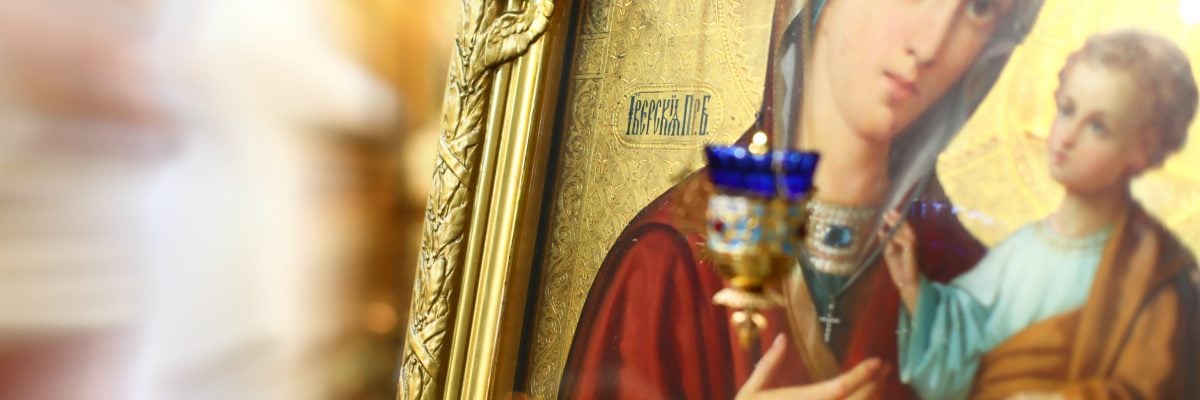
Not long ago I was discussing Mary with a Protestant who made a startling assertion.
“I just don’t see why Mary is such a big deal for Catholics,” she said. “I mean, she was the vessel the Son used to come into the world, but even still . . .”
My eyebrows shot up. Although some Church Fathers did refer to Mary as a “holy vessel,” I could tell that this woman meant that Mary was a “mere vessel”—nothing to be praised in any special way.
“So you think Mary was merely a vessel God used to become man,” I replied. “Tell me, if we did a DNA test on Jesus and Mary, would they be related?”
“No, I don’t think so.”
When I heard this response, I was floored. But upon further reflection, I saw how this attitude corresponded to a common Protestant undervaluing of Mary and her role as the Mother of God. How can we expect someone to grasp the fittingness of something like the Immaculate Conception if she doesn’t understand the most basic fact about Mary’s divine maternity—what makes her worthy of veneration in the first place?
The Catechism says of Mary:
The One whom she conceived as man by the Holy Spirit, who truly became her Son according to the flesh, was none other than the Father’s eternal Son, the second person of the Holy Trinity. Hence the Church confesses that Mary is truly “Mother of God” (495).
But it’s not just Catholic dogmas about Mary that become unintelligible when considered apart from her divine maternity. What we believe about Jesus falls apart, too. If we don’t understand how Christ’s mother is related to him, then we are certain to stumble into a heresy that denies the Incarnation. After all, how could Jesus be born of a woman (Gal. 4:4) and be like us in all things except sin (Heb. 4:15) if he was not genetically related to his mother?
Those who say Mary gave birth only to Christ’s body or his “humanity” must, explicitly or implicitly, also claim that the Second Person of the Trinity never existed in Mary’s womb, never traveled through her birth canal, and became united to the body of Jesus only sometime after his birth. But when did that happen?
In the second century, Hippolytus of Rome mentioned a man named Theodotus, who said Christ was a sinless man born of a virgin who became the Son of God only when he was “adopted” at his baptism. Hippolytus said some of Theodotus’s followers “are disposed [to think] that never was this man made God, [even] at the descent of the Spirit; whereas others [maintain that he was made God] after the resurrection from the dead” (Refutation of All Heresies, 23).
This Adoptionist heresy manifests itself today in those who believe that Jesus was just a man who “became God” later in life. But this contradicts the common view of the Incarnation and Christ’s divinity—a view that Catholics, Protestants, and Eastern Orthodox Christians share—that Jesus Christ is and always has been fully God and fully man. The Council of Chalcedon declared in the fifth century:
The Son is everlasting together with himself, differing in nothing from the Father, because he was born as God from God, almighty from almighty, coeternal from eternal; not later in time, not inferior in power, not unlike him in glory, not divided from him in essence, but the same only-begotten and everlasting Son of an everlasting parent was born of the Holy Ghost and the Virgin Mary.
According to some Protestants, even if Mary is the Mother of God, Christians should not say she is, because that can mislead less educated people. As John Calvin said, “To call the Virgin Mary the Mother of God can only serve to confirm the ignorant in their superstitions.” Or, as the modern Protestant apologist Matt Slick put it, “The term ‘mother of God’ runs the risk of suggesting that Mary is somehow divine and part of the Godhead.”
But this objection is as weak as saying that we should not call Jesus the Son of God because that runs the risk of suggesting that God has a wife or that God engaged in sexual relations with Mary. This is not an absurd or merely hypothetical concern. Early Mormons like Brigham Young understood Jesus’ identity as Son of God in just this way: that Jesus was “begotten of his Father, as we were of our fathers” (Journal of Discourses, 8:115). Many Muslims reject the Incarnation precisely because they think it entails that God physically begot Jesus through Mary.
These examples show that a doctrine should not be rejected just because it can be misunderstood. If that were the case, our faith would have few or possibly no doctrines at all!
Other Protestants say Mother of God (Greek, theotokos) was originally meant to honor Christ, not Mary. James White writes, “Any use of [theotokos] that is not simply saying, ‘Jesus is fully God, one divine person with two natures’ is using the term anachronistically, and cannot claim the authority of the early church” (Mary: Another Redeemer?, 48). But it is not true that the title of theotokos was originally meant only to honor Christ. Consider an excerpt from this sermon that Cyril of Alexandria preached at the Council of Ephesus:
O Mary Mother of God, venerable treasure of the entire world, inextinguishable lamp, crown of virginity, scepter of orthodoxy, imperishable temple, container of him who cannot be contained . . .
The unending wonder of the Incarnation means there is no shortage of praise both for Jesus and his mother. Fortunately, some Protestant authors are willing to critique peers on this point. For example, Baptist scholar Timothy George writes in his article, “The Blessed Virgin Mary in Evangelical Perspective”:
Mary was not merely the point of Christ’s entrance into the world—the channel through which he passed as water flows through a pipe. She was ever the mother who cared for the physical needs of Jesus the boy. She was the one who nursed him at her breast and who nurtured and taught him the ways of the Lord.
He goes on to offer a helpful exhortation to Protestants who are still on the fence concerning Mary’s divine maternity:
It is time for evangelicals to recover a fully biblical appreciation of the Blessed Virgin Mary and her role in salvation history. . . . Evangelicals can and should join the church catholic in celebrating the Virgin Mary as the mother of God, the God-bearer, or, as Jaroslav Pelikan suggests that we might better render Theotokos, “the one who gave birth to the One who is God.”



